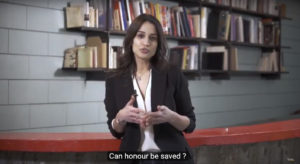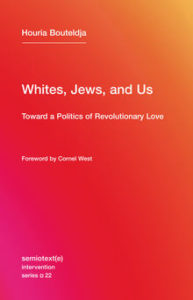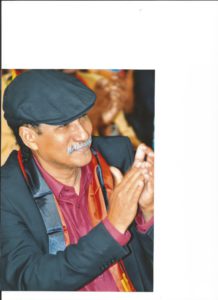 Louisa Yousfi is a decolonial journalist and activist. For the past 7 months she has been hosting the online broadcast Paroles d’honneur (https://www.youtube.com/channel/UCTth6-5ZiCD_CUJ6xOMug_w).
Louisa Yousfi is a decolonial journalist and activist. For the past 7 months she has been hosting the online broadcast Paroles d’honneur (https://www.youtube.com/channel/UCTth6-5ZiCD_CUJ6xOMug_w).
First, would you mind tracing back the emergence of the show?
The idea of this show emerged in a specific context; the presidential campaigns were coming up and we knew it would be painful as usual for postcolonial and poor neighborhood populations. We knew that the media mechanisms that frame the political discourse would prevent the rise of an autonomous voice that would take into account this special category of the population ; this of Blacks, Arabs, Muslims and poor neighborhood residents. This phenomenon engenders a situation that might be comical if It did not hold drastically negative consequences; while we are omnipresent in the media, endlessly debated in « expert » mouths as objects of study, of both fascination and repulsion, we are however never really present as producers of discourse and meaning.
The presidential campaign is a time where these media processes become exacerbated, where the main TV channels struggle to hide the propaganda dimension of their editorial line. Some would debate it as the « Ideological apparatus of the State ». But it is a fact; we are the ever-absent members of the party, and absent people are always wrong. The show thus takes its origins from the activists of the « political antiracist » or decolonial movement, from journalists and intellectuals who chose to answer an ambitious challenge. They are striving to give visibility to this activist, political and social reality that blossoms, struggles, thinks and moves strategically forward within the French political space, while holding for sole media projection a deforming mirror that only mutes it or demonize it to discredit its existence. Yet we are convinced that we have often more to say about our dominant themes such as racism, imperialism, police violence than professionals of public speech, but also on a wider array of societal themes. That is why our slogan is « by us for all ». It makes a clear statement in regards to our lens on the history of the immigration struggles while targeting the rest of society that wishes to join or to be confronted to a new way to debate politics in France. In sum, it is a new form of radicalism, an opportunity to invent a new political space. That space materialized perfectly within that café called “La Colonie” where we film our shows, which was created by Franco-Algerian artist Kader Attia, himself acquainted with decolonial issues. That highly symbolic space was inaugurated on Oct. 17th 2016 in memory of the Algerian victims of Oct. 17th 1961. During the first and second round of the French elections, it quickly became a true “decolonial headquarter”; in other words a space where those who do not find resonance in the current political offer can hear about original and off the beaten track analyses, and openly react to issues that remain little debated. Close to 300 people were present during both electoral nights, and almost 50 000 others watched live the online videos we posted, demonstrating that we guessed right! Undoubtedly Paroles d’honneur answers a real need of thoughts reflection and confrontation in a respectful yet frank framework.
Finally, I must admit having particular affection for this format that we call “Great debates”, in which I invite philosophers (Etienne Balibar, Tristan Garcia, Norman Ajari) to converse on issues at the crossroads of philosophy, politics and other human sciences. We have, among others, organized debates on “political dignity” or on “universalism”. These are beautiful high-level debates that have the capacity to bring another level of abstraction and intelligibility to social movements. This is certainly less accessible and less fitting to the general public, but not less important. This is where we are able to develop, enrich and experiment the intellectual production of postcolonial topics, in contact with other thoughts from a different political culture. Knowledge also entails a stake of power. We need to invest it without shame, to occupy all fields that produce meaning and systems of truth. In other words, at Paroles d’honneur, we are home everywhere!
Why did you create a specific show instead of imposing decolonial issues into more “traditional” media?
Because that space is a minefield for us! Traditional media mechanisms are so locked that the rare television appearances of those from our ranks are systematically set up as trials. Their arguments are either discredited on account of irrelevance because not fitting the national republican model, or they are required to defend themselves from a list of accusations made up for the occasion. They are almost never invited to contribute to the debate but rather turn into the popular scapegoat. For instance, I am thinking about the intervention of CCIF (Group against islamophobia) ex-president Marwan Muhammad on the stage of the Salut Les Terriens show. While he was officially invited to present his upcoming book, he was instead freely insulted by Lydia Guirous and Sonia Mabrouk. Let us contemplate in the meantime the orchestrated set up that consists in placing Arab women who represent the quintessence of integration to face an Arab man and unapologetically call him an islamist, a communautarist, a manipulator, etc. Have we even talked about the content of his book? Of course not! Same record for Houria Bouteldja and Maboula Soumahoro when they got invited on the stage of Ce soir ou Jamais. Thomas Guénolé did not engage any debate, he simply prevented any opportunity to do so by pouring down dishonest and preposterous accusations that hit the nail on the head to an audience little acquainted with decolonial theses. How do you make your voice heard in such conditions? That is why it is important for spaces like ours to exist in order to bring back meaning to debates. That being said, I completely respect those who have the courage to carry a different voice and remain uncompromising amidst traditional shows. It is an ambitious strategy that demonstrates a slight evolution of power dynamics into our favor, but which also seems insufficient to me if it is not accompanied by the appearance of new independent media such as Paroles d’honneur.
What conclusions can you draw from this first season?
A very positive result! On all accounts! First and foremost, I sincerely believe that few shows in France can praise themselves on such quality in terms of political content and in depth reflection. Guests who accepted to come to the show all brought an original, audacious and informed point of view. Among them you could find intellectuals, activists and artists such as Françoise Vergès, Farida Alamazani, Olivier Le Cour Grandmaison, Norman Ajari, Nacira Guénif, Na Boakye, Marwan Muhammad, Amal Bentousi, Danièle Obono, Ulysse Rabaté, Omar Slaouti, Étienne Balibar, Tristan Garcia, Laurent Lévy, Maboula Soumahoro, Michèle Sibony, Michelle Guerci, Stella Magliani-Belkacem, Patrick Simon etc. Besides, thanks to the format of the “QG” show that privileges free speech without time constraints -some shows lasted up to 3 hours-, guests were able to carry out their meaning to its conclusion and develop it without any presenter threatening them to turn off the microphone. The latter always mutilates the complexity of the discourse, and thus its richness and relevance. As far as I am concerned, I have always found exasperating that habit of TV hosts to systematically interrupt their guests when they are barely starting to develop their argument. “Time is running out”, yes, but we end up wondering what was the point of organizing a debate altogether if none of the guests was given enough time to explicit the argument they are there to make. I have thus tried to set up a more flexible, less conventional style but with an interactive dimension where members of the audience can intervene at any point and ask questions to our guests. It works a little like in the show Droit de reponse from Michel Polack, which brought fresh air into the French media landscape. The result is conclusive in many regards, but I am quite proud of what we were able to accomplish with so little means.
Looking back, I would say that the first two “QG” shows were important because they offered a real visibility to the decolonial political field at a time where a true electoral catastrophe was taking place. But the following show entitled “Mélanchon est il notre pote?” (Is Mélanchon our friend?) came out as a real upgrade in quality. This is when we managed to come out from the “decolonial inner circle discourse”. This show was far from being consensual and allowed the expression of real political and strategic disagreements, mostly thanks to the presence of representatives of the “France insoumise” (unsubmissive France) movement such as Danièle Obono and Ulysse Rabaté, who had the courage to come defend their perspectives on a field where they knew they would not be done any favor. We wish to pursue our mission towards this type of debates, by inviting people who do not necessarily share the decolonial political lens, but who have the courage to question and confront it “fairly” as I like to say.
Could you tell us more about this second season?
We already have several topics and themes: Does French soccer wash whiter? Is rap universal? Can we politicize treason? And so many other ideas that we will soon expose. They will share the fact to be sensitive, very rich and all crossing decolonial issues in some way or another. We will not forget to touch at topics that will be dictated by current political updates of the coming year.
Paroles d’honneur claims to be a 100% autonomous media; how is the show funded?
Paroles d’honneur is a pure activist product. It does not depend on any public or any obscure funding. It mostly relies on the free volunteering work of a few committed persons who dedicate a significant amount of their energy and time to move things forward consistently with their political ideals and convictions. This is a very important aspect because it demonstrates how Paroles d’honneur does not emerge from the middle of nowhere, but from the struggles from which it gets its legitimacy and its moral and intellectual integrity. However, the technical quality of our shows induces expenses. We need to pay for material, technicians, the floor manager, the sound engineer and cameramen. All of that combines into a consequent sum that we have precisely determined in the funding campaign we started a few days ago on the Kiss Kiss Bank Bank platform. We fixed a first security cap of about 13 000 euros, but that cap would only allow to fund three shows. In reality, we hope to double that sum to fully secure a full season of shows. That is why we are calling for financial support to all those who recognize themselves in the claim of decolonial politics. By that, we mean those who support it, those who love it, those who doubt it but give it legitimate existence in the media, those who wish to better know it, frame it, join it, tweak it here and there or clearly challenge it without consciously maintaining misunderstandings. Finally, we address our call for support to those who care for real debates and for a real and honorable exercise of politics.
Interview by Selim Nadi
Translation by Aude Chesnais




